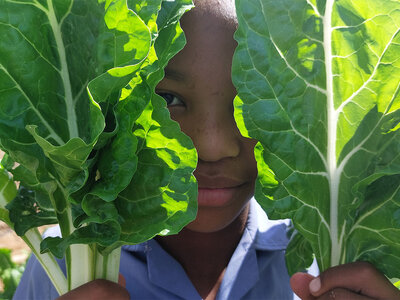Namibia
- 1.3 million
- people are food insecure
- 37 percent
- of the population unemployed
- 3 million
- population
Namibia is an upper-middle-income country with a population of 3 million people. Despite economic recovery, it still faces persistent socioeconomic challenges.
In 2023, unemployment rates stood at 36.9 percent for the population and 44.4 for young people. The country grapples with high inequality. According to the 2024 Global Hunger Index, Namibia suffers from a serious level of hunger, ranking 86th out of 121 countries.
Namibia has had significant progress in human capital development since the introduction of the school feeding programme in 1990. The national school meals programme reaches 466,860 students in over 1,500 schools in all 14 regions of the country. WFP and Government are extending the programme to early-childhood development centres, as well as improving safety, storage and nutritional content.
Climate change is primarily characterised by persistent droughts and erratic rainfall, damaging agricultural productivity as well as food and nutrition security. In May 2024, the Government of Namibia declared a state of emergency due to El Niño induced drought – regarded as the worst in 100 years. This is expected to increase food insecurity.Indigenous peoples are especially vulnerable to the impacts of climate shocks due to factors such as limited production capacity and restricted access to resources.
The World Food Programme’s focus is on ensuring people can meet their food and nutrition needs in times of crises; strengthening national social protection systems and national food systems; and deploying our services and expertise to the Government and other partners, especially in supply chains.
What the World Food Programme is doing in Namibia
-
Rural transformation
-
The Rapid Rural Transformation initiative represents an innovative approach to tackling the complex challenges encountered by rural communities. This initiative promotes rural development through agricultural production, livelihood diversification, skills development, and access to essential services.
-
Home-Grown School Feeding
-
Nutrition
-
Food systems
-
Climate and resilience
-
Social protection
-
Digital transformation
Namibia news releases
Go to pagePartners and donors
Find out more about the state of food security in Namibia
Visit the food security analysis pageOperations in Namibia
Contacts
Office
38-44 Stein Street, Klein Windhoek, Namibia
Windhoek
Namibia







